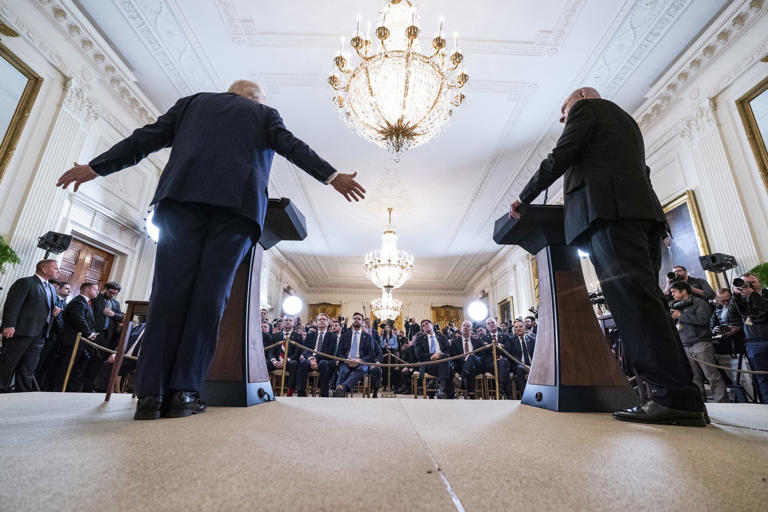“Trump’s Gaza Plan Is DOA – But It Exposes a Harsh Truth!”
Less than a day after President Donald Trump made a shocking proposal, his aides were scrambling to walk it back. His unexpected idea—suggesting U.S. “ownership” of Gaza and the removal of its entire Palestinian population—was met with immediate backlash from European and Arab allies. As officials woke up to the news on Wednesday, many were stunned by the suggestion that the war-torn territory could be transformed into the “Riviera of the Middle East,” with its Palestinian residents relocated elsewhere in the region.
But key questions loomed: How would such a plan be enforced? Under what authority? And who would foot the bill? Even Trump’s allies in Washington, some blindsided by the proposal, struggled to explain his vision.
White House press secretary Karoline Leavitt insisted that Trump was offering ideas, not a concrete plan. “It’s been made very clear to the president that the U.S. must be involved in rebuilding efforts to ensure regional stability,” she said. “But that does not mean American boots on the ground or taxpayer funding. It means Donald Trump, the best dealmaker on the planet, will strike a deal with our partners in the region.” National Security Adviser Michael Waltz echoed the sentiment, calling Trump’s remarks “bold, fresh, new ideas” meant to push Middle Eastern governments to find solutions.
Despite the backlash, Trump doubled down the next day. Posting on Truth Social, he claimed that Israel would turn Gaza over to the U.S. once the fighting ended. He painted a grand vision of rebuilding efforts, promising that “one of the greatest and most spectacular developments of its kind” would emerge, all without U.S. troops on the ground. “Stability for the region would reign!!!” he declared.
But the world remains skeptical.
And what about Gaza’s people? Trump suggested they would be “resettled in far safer and more beautiful communities” with “new and modern homes” elsewhere in the region, where they would be “happy, safe, and free.” Notably absent was any mention of their right to return.
Adding to the controversy, Trump bizarrely referred to Sen. Charles E. Schumer (D-N.Y.) as a “Palestinian” in what appeared to be an attempted insult—one he has used before on the campaign trail.
At the core of Trump’s argument, echoed by his allies, was the notion that Gaza’s devastation had somehow nullified Palestinian claims to the land. He dismissed it as a “demolition site,” a framing that aligned with some of Israel’s most hardline voices. Israeli Defense Minister Israel Katz quickly instructed the military to prepare for the “voluntary” migration of Gaza’s population, while far-right Israeli politicians hailed Trump’s remarks as a step toward permanently burying hopes for a Palestinian state.
“The United States has not only sided with Israel but specifically with its most extreme political elements,” said Amnon Aran, a professor of Middle East politics at City University of London. He warned that Trump’s use of “resettlement” was, in reality, a euphemism for forcibly uprooting millions of Palestinians—an act that could trigger widespread political and security instability.
Aran also pointed to the grim realities behind the proposal: Gaza is currently uninhabitable, and decades of failed peace efforts have left millions of Palestinians under occupation with no clear path forward.
Enter Trump with his so-called “fresh” ideas. His Gaza takeover plan may have been influenced by his son-in-law, Jared Kushner, a real estate developer and Trump’s former Middle East envoy. Kushner has previously floated the idea of turning Gaza into a high-end luxury destination while relocating its population to new developments in the desert. “I would try to move people in there,” he said at a Harvard event last year. “I know that won’t be the popular thing to do, but I think that’s a better option to finish the job.”
Unsurprisingly, Palestinians have rejected Trump’s plan outright, calling it a prelude to mass displacement. Arab nations, including Jordan, Egypt, and Saudi Arabia, have also issued strong warnings against any moves that would undermine a Palestinian state or further Israeli settlement expansion. U.N. Secretary-General António Guterres denounced “any form of ethnic cleansing,” while Western governments echoed his alarm.
“Expelling the Palestinian civilian population from Gaza would not only be unacceptable and contrary to international law,” German Foreign Minister Annalena Baerbock said, “it would also lead to new suffering and new hatred.” France’s foreign ministry was equally clear: “Gaza’s future must not be under the control of a third state, but within the framework of a future Palestinian state.”
For months, Israeli Prime Minister Benjamin Netanyahu has avoided serious discussions about Gaza’s postwar future, sidestepping Palestinian political aspirations. Trump’s proposal provides yet another way to ignore them. Rather than working with Arab leaders—who see Gaza’s reconstruction as part of a larger effort to revive Palestinian statehood—Trump and Kushner appear more interested in real estate-style mega-projects, drawing inspiration from Dubai’s skyscrapers and Saudi Arabia’s futuristic city plans.
“The idea that Gaza can be treated like a real estate deal—redeveloping a derelict wasteland—might appeal to a property mogul like Trump,” said Marc Weller, a professor of international constitutional studies at the University of Cambridge. “But who exactly would grant the U.S. ownership of the territory? Gaza is not an empty plot of land.”
Dubai-based political analyst Abdulkhaleq Abdulla summed up the widespread shock: “Trump says a lot of crazy things, but no one expected this. If this was a negotiation tactic, it wasn’t a smart one. This isn’t how you bring stability to the region.”
